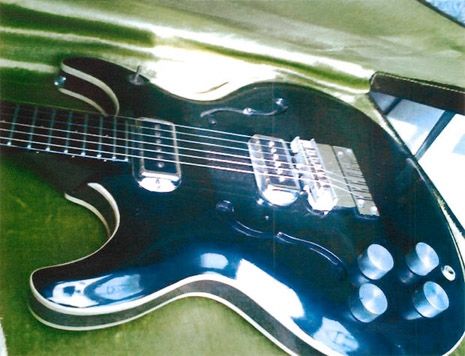
Tuscon, AZ music store Rainbow Guitars has come to possess a very special item: a Black Widow guitar, an example of the only guitar model ever offered by the Acoustic Control Corporation, a company far better known for amps. This one was a rare left-handed model, and to ice that cake, it was once owned by Jimi Hendrix.
The alleged provenance is this: the guitar was given by Hendrix to his adopted sister Janie, who married Earth, Wind and Fire/Commodores guitarist Sheldon Reynolds. Hendrix either gave Reynolds the instrument, or he obtained it in their divorce settlement (this is unclear and online sources differ). Reynolds sold the guitar to one Brian Patterson—named by some sources as a “business partner” of Reynolds’—who in turn sold the instrument to Rainbow’s Harvey Moltz.
There’s a missing piece to that provenance claim—before selling the instrument to Moltz, Patterson endeavored to sell the instrument through Julien’s Auctions of Beverly Hills, CA, which provoked a lawsuit last year by Experience Hendrix, the business entity run by Hendrix’s family in an endeavor to keep control of the guitarist’s legacy. Now it’s Moltz who finds himself being sued by Experience Hendrix. Via the Arizona Daily Star:
Rainbow Guitars owner Harvey Moltz says he paid $80,000 last year for the Black Widow guitar. But in an Oct. 2 complaint, the company that runs Hendrix’s estate claimed Moltz is not the rightful owner of the guitar and asked a Pima County Superior Court judge to direct him to return the guitar and pay damages.
Experience Hendrix said in its complaint that it first learned the guitar was missing in June 2014 when Julien’s Auctions — a Los Angeles firm that bills itself as “the auction house to the stars” — called to authenticate a claim made by Brian Patterson, who was trying to auction the Black Widow.
At the time of the sale, Patterson showed Moltz a letter stating Janie Hendrix had given the Black Widow to Reynolds during their marriage, Jackson wrote in a June 15 letter to the lawyers representing Experience Hendrix.
The Oct. 2 complaint follows a November 2014 lawsuit filed by Experience Hendrix against Patterson and Reynolds in Los Angeles. In June, the company learned Patterson no longer possessed the guitar.
It’s a thorny matter to sort out. For now, the guitar isn’t listed on Rainbow’s web site, and Motz isn’t listing it for sale until the courts sort the matter out, assuming the instrument can be authenticated as Hendrix’s, which is yet ANOTHER thorny matter. Different Black Widow models were made, some by a company called Bartell, and some by the Mosrite company, famous for the offset-body guitars played by surf champs the Ventures and by punk progenitor Johnny Ramone. Some models had 24 frets, some had 22. Some were solid bodied, and some, like the one in contention, were semi-hollow. For a guitar of which only about 1,000 were ever built, the Black Widow’s got some variations. Guitar geeks could probably argue for years about which one belonged to whom.

Experience Hendrix has done a lot of good by Hendrix’s legacy in rehabbing bootleg material to higher standards of audio fidelity, and by rather triumphantly getting Hendrix’s notorious exploiter Ed Chalpin out of the picture at long last. They’ve also been seen in some circles as a greedy entity trying to squeeze blood from a stone, and in some ways no less exploitative than Chalpin. While the latter characterization seems one dimensional and over-harsh to me, suing to force an independent shop to simply hand over an instrument for which it paid $80K in good faith and asking for damages on top of that (prompting the question, what damages were done to them by not possessing a guitar of disputed provenance that was so “priceless to them” that they didn’t even consider it missing until an auctioneer asked them to authenticate it?) is rather easy to interpret as the grabby move of a deep-pocketed Goliath that’s looking to control all it can. If their version of events is correct and the guitar was never actually Patterson’s to sell (an assertion arguably given some weight by the inconsistencies in Reynolds’ provenance stories), isn’t the guitar shop the victim of an opportunistic and illegitimate seller? Why not just reimburse Moltz the $80K he’s out if the guitar is so priceless, instead of racking up court costs, attorney fees, and huge bad vibes? It merits mentioning that Janie Hendrix, through whom the guitar passed into Reynolds’ possession, is now the CEO of Experience Hendrix. It also merits mentioning that I’m not a legal expert in Seattle or Tucson or anywhere for that matter, and that all of these foregoing are of course merely a layperson’s ruminations.
I tried my damnedest, dear reader, to find motion footage of Hendrix playing the guitar in question. Evidently the Black Widow’s rarity and badassery weren’t enough to get him to abandon his inverted Strats for very long. I hope you’ll settle for this footage of “Purple Haze” from the Atlanta Pop festival on July 4, 1970. It’s culled from Jimi Hendrix: Electric Church which ran on Showtime last month, and is still available to HuluPlus users who plunk the extra dough for the Showtime streaming option. It will be released on physical media at the end of October. A remastered audio-only release of that set is already available under the title Freedom.
Via Reverb
Previously on Dangerous Minds:
Before he was Jimi: Jimmy Hendrix with Curtis Knight and the Squires
The Jimi Hendrix blooper reel
Jimi Hendrix’s eye-popping receipts from legendary NYC shop Manny’s Music